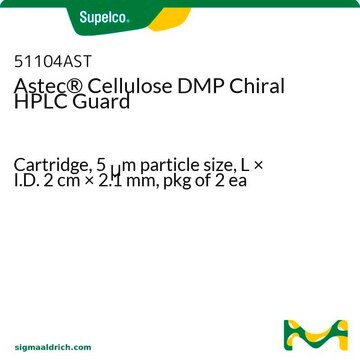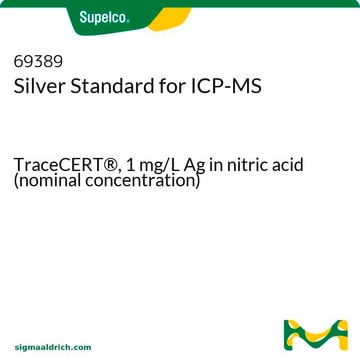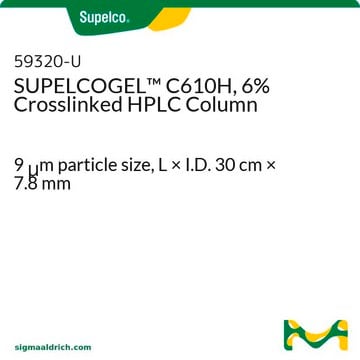51099AST
Astec® Cellulose DMP Chiral (5 μm) HPLC Column
L × I.D. 25 cm × 4.6 mm, HPLC Column
Synonym(s):
Cellulose DMP Chiral Stationary Phase
About This Item
Recommended Products
product name
Astec® Cellulose DMP Chiral HPLC Column, 5 μm particle size, L × I.D. 25 cm × 4.6 mm
material
stainless steel column
Agency
suitable for USP L40
product line
Astec®
packaging
pkg of 1 ea
manufacturer/tradename
Astec®
parameter
0-40 °C temperature
50 bar pressure (725 psi)
technique(s)
HPLC: suitable
L × I.D.
25 cm × 4.6 mm
matrix
fully porous particle
silica gel high purity, spherical
silica gel particle platform
matrix active group
cellulose, DMPC- phase
particle size
5 μm
pore size
100 Å pore size
operating pH
3.5-6.8
separation technique
chiral
Looking for similar products? Visit Product Comparison Guide
General description
Description: Spherical, porous silica coated with DMPC (dimethylphenyl carbamate)-derivatized cellulose
Particle diameter: 5 μm
Field of Use: Small molecule enantiomer separations in normal phase, polar organic, and SFC modes
Application
- Enantioseparation of Synthetic Cathinones Enantiomers with Tertiary Amine Structure in Urine and Plasma.: This research investigates the application of the Astec Cellulose DMP Chiral HPLC Column for the enantioseparation of synthetic cathinones enantiomers in biological samples. The study demonstrates the column′s efficacy in separating enantiomers with high resolution and sensitivity, particularly in complex matrices such as urine and plasma. This highlights the column′s utility in forensic and clinical analysis, providing a robust method for the detection and quantification of chiral drugs in biological samples (Meetani et al., 2019).
Legal Information
Choose from one of the most recent versions:
Already Own This Product?
Find documentation for the products that you have recently purchased in the Document Library.
Customers Also Viewed
Chromatograms
application for HPLCapplication for SFCapplication for HPLCapplication for HPLCShow MoreOur team of scientists has experience in all areas of research including Life Science, Material Science, Chemical Synthesis, Chromatography, Analytical and many others.
Contact Technical Service









